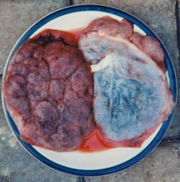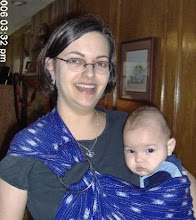
Item One: The Hawaii legislature has passed a measure allowing parents to take home their baby's placenta, a practice currently prohibited by state health rules. ("Hawaiian parents seek right for birth ritual")
Here's a question - what experience have any of you had requesting or receiving your placenta after a hospital birth? Please leave me a comment. I would also be interested to know what country, state, or metro area you live in. And what reason was given if the placenta was not released to you.
In California, you must have a license to transport medical waste, which makes things a little tricky for homebirth midwives (Placenta Disposal).
With my first birth, I merely requested in my birth plan to be shown the placenta, something which did not happen. (The Doctor or Midwife has to look it over anyway, they might as well do it in front of you.) With my second, a homebirth, I got to examine it but I did not choose to keep it, something I now regret. I think it got thrown out with the trash. Our third son's placenta is happily sitting in our freezer next to the ground beef and frozen chicken breasts. Some day we will plant something nice over it, like a tree or a rosemary bush. Then we will never be able to sell that house. Just kidding.
Once I blogged about a thief who stole food from a freezer - including a placenta.
The placenta was, after all, a baby's companion since, well not quite since conception, but close. It was the source of the baby's nutrition, oxygen, and so forth, and it deserves some respect. I'm not really a fan of lotus birth, but I can definitely see the attraction.
Item Two: Okay, this happened in February, but I had a one month old baby and didn't get around to blogging it:
From 1996 to 2003, hospitals throughout Oregon, Washington and California quietly collected the placentas of as many as 700 women who suffered difficult births. They sent the placental tissue to a Portland institute underwritten by the insurance industry. The institute, called Cascadia Placenta Registry, was separate from the hospital's own pathology labs; it existed in large part to help doctors sued for malpractice.
This marshaling of evidence often happened without patients' knowledge or direct consent. One of the patients, Angela Desbiens, didn't know her placenta had been squirreled away as evidence until after she sued Providence St. Vincent Medical Center for failing to prevent fetal distress.
In the process, Desbiens learned that Cascadia had sliced her placenta into chunks, making it harder for other pathologists to analyze. She also discovered that Cascadia used incorrect information about the birth, as well as genetic data from some other patient, to draw its unsurprising conclusion that the hospital wasn't to blame for her child's brain damage.
Hat tip to the American Journal of Bioethics Blog.
Item Three: Tom Cruise and the very, very pregnant Katie Holmes have been the subject of much birth gossip lately, but Tom doesn't do much to squelch those rumors, does he? He is reported to have told GQ Magazine he would eat the placenta ("Is it safe to eat a placenta?"), but later made it clear to Diane Sawyer that he wouldn't ("Cruise Downplays Placenta Plan").
Ok, let's answer that question. Placentas have a great deal of prostiglandins and oxytocin, and they can be used in an emergency to slow postpartum hemorrhage when eaten or placed in a woman's mouth between her cheek and gum. Personally, I think it would be much saner just to let midwives administer pitocin. Ya think?
Placentas also have, apparently, a large amount of iron and other nutrients, so if they are consumed, after either being cooked or freeze dried and placed into capsules, they supposedly help the woman gain back her strength after the birth (see Medicinal Uses of the Placenta). Ok, I am going to draw a line here. If you want to eat your own placenta, fine. Personally, I would have to be bleeding to death before I would do so, but that's just me. But please, don't eat anyone else's. That's just gross. And probably not safe, either.
Must we go here? Apparently we must:
Placentophagy from Wackipedia
Wikibooks Cookbook




No comments:
Post a Comment